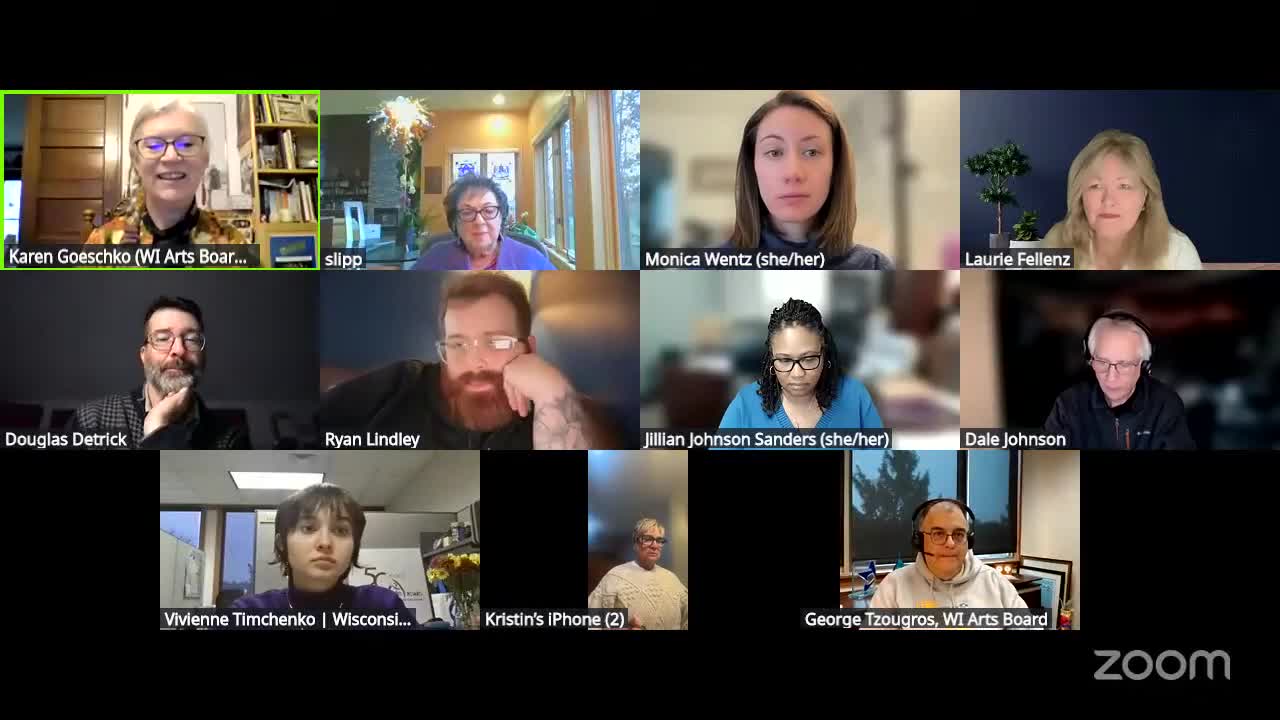Wisconsin Arts Board convenes grant-review panel; reviewers urge clearer data, strategic planning and better work-sample access
Get AI-powered insights, summaries, and transcripts
Subscribe
Summary
Panelists convened for a two-day review of small-budget arts grant applications, praising community reach and programming while urging clearer audience data, fundraising strategies and improved access to applicant work samples. No formal board votes were taken during the session.
The Wisconsin Arts Board convened an advisory review panel that began evaluating creation-and-presentation grant applications from small volunteer arts organizations across the state. The virtual session, recorded and streamed live, included external music and arts professionals who evaluated applications on artistic value, organizational and financial management, community participation and planning.
Panel chair Susan Lipp opened the meeting and reminded attendees, “We are now recording, and we're live on YouTube.” Staff described the program and the board's role; George Seagross, identified by staff as the agency's director, thanked panelists for their time. Panelists were instructed to score each application on a 1–100 scale and were told that “if an applicant has received less than 50 points … they are automatically taken out of consideration for a grant this year,” a procedural rule staff said would be applied before funding amounts are calculated.
Panelists spent the session reviewing applications from more than a dozen volunteer ensembles and small arts organizations, including the Central Chamber Chorale (Marshfield), Waukesha Choral Union, Red Cedar Symphony (Rice Lake), Wisconsin Chamber Choir (Madison), Menomonee Falls Symphony Orchestra and dozens of community choirs and ensembles. Across reviews, recurring strengths included long-standing community ties, strong volunteer leadership, and programming that connected audiences and youth education. Reviewers repeatedly praised examples of inclusive outreach — for instance, Madison area handbells’ sensory-friendly performances and the Choral Arts Society of Racine’s prison reentry partnerships — as models worth lifting.
At the same time, reviewers repeatedly asked for clearer quantitative evidence from applicants. Panelists requested consistent audience-tracking (attendance trends, season-ticket metrics, livestream numbers), cash-balance details and more granular work samples. Several reviewers recommended clearer strategic planning or succession plans where organizations were experiencing leadership turnover. Multiple applicants were noted to have balanced current-year budgets but rising costs or shortfalls in prior years; panelists urged more explicit fundraising strategies and diversification of donor development.
Staff also handled several technical and process issues during the session. Some panelists could not access certain applicant work-sample links; staff asked reviewers to list inaccessible samples so staff could redistribute links or re-share screens. The chair reiterated conflict-of-interest guidance: panelists should disclose relationships that would create a direct financial benefit and withdraw from reviewing those applications; past unpaid participation was not automatically disqualifying.
Panelists and staff said the panel’s recommendations will be reported to the full Wisconsin Arts Board in December, at which point the board will approve or deny funding. Staff emphasized that panelists are advisory: they evaluate and score, but the board approves awards and staff apply a formula that factors scores, budgets and the number of eligible applicants to determine grant amounts. Panelists were asked to flag best practices found in applications so staff could circulate them to applicants and other reviewers.
The panel recessed at the end of the session with instructions to reconvene the next day to complete reviews and to email staff any remaining access problems. No formal votes or grant approvals occurred during the panel meeting; the session focused on evaluation and written recommendations for the board.
